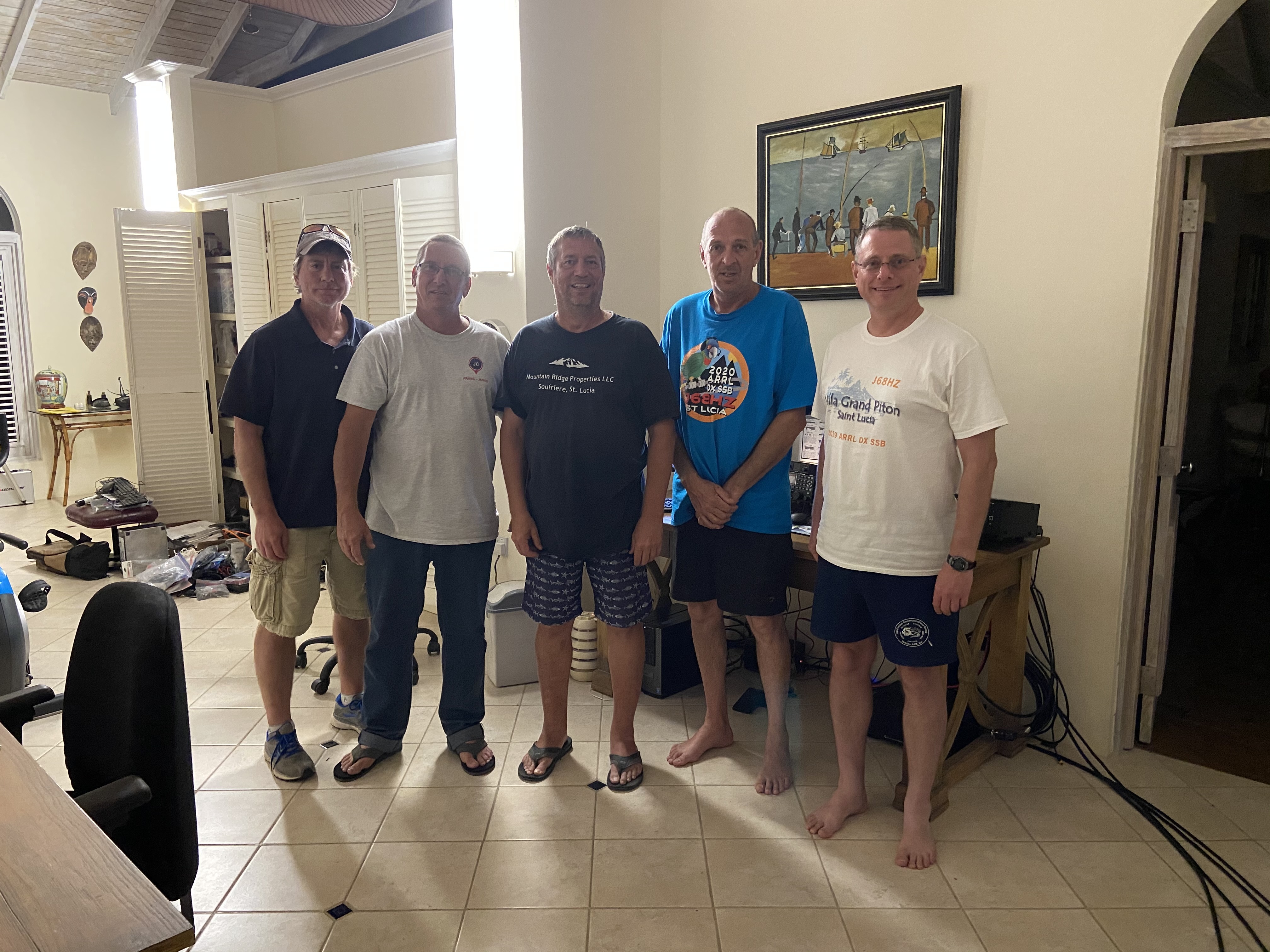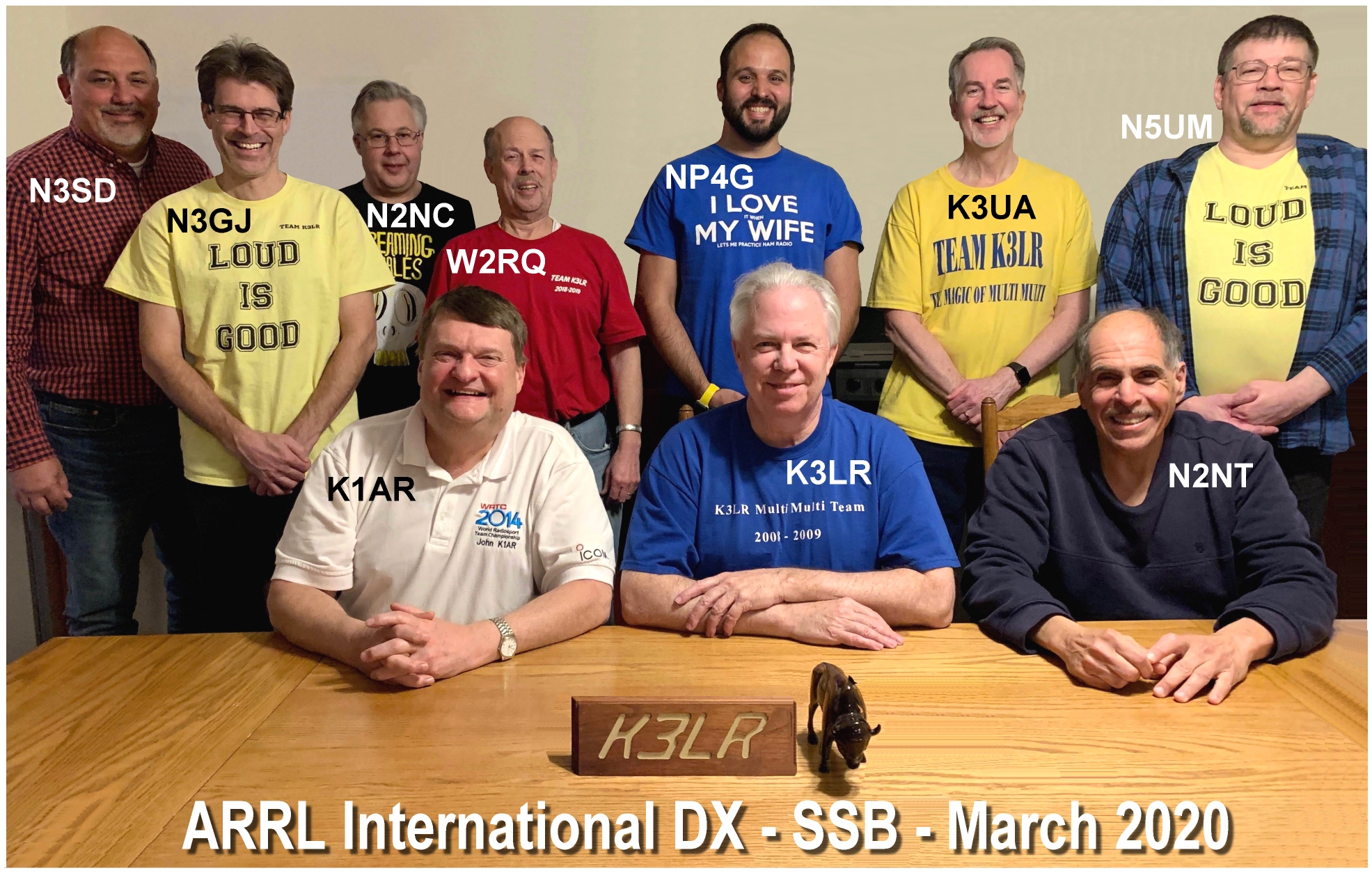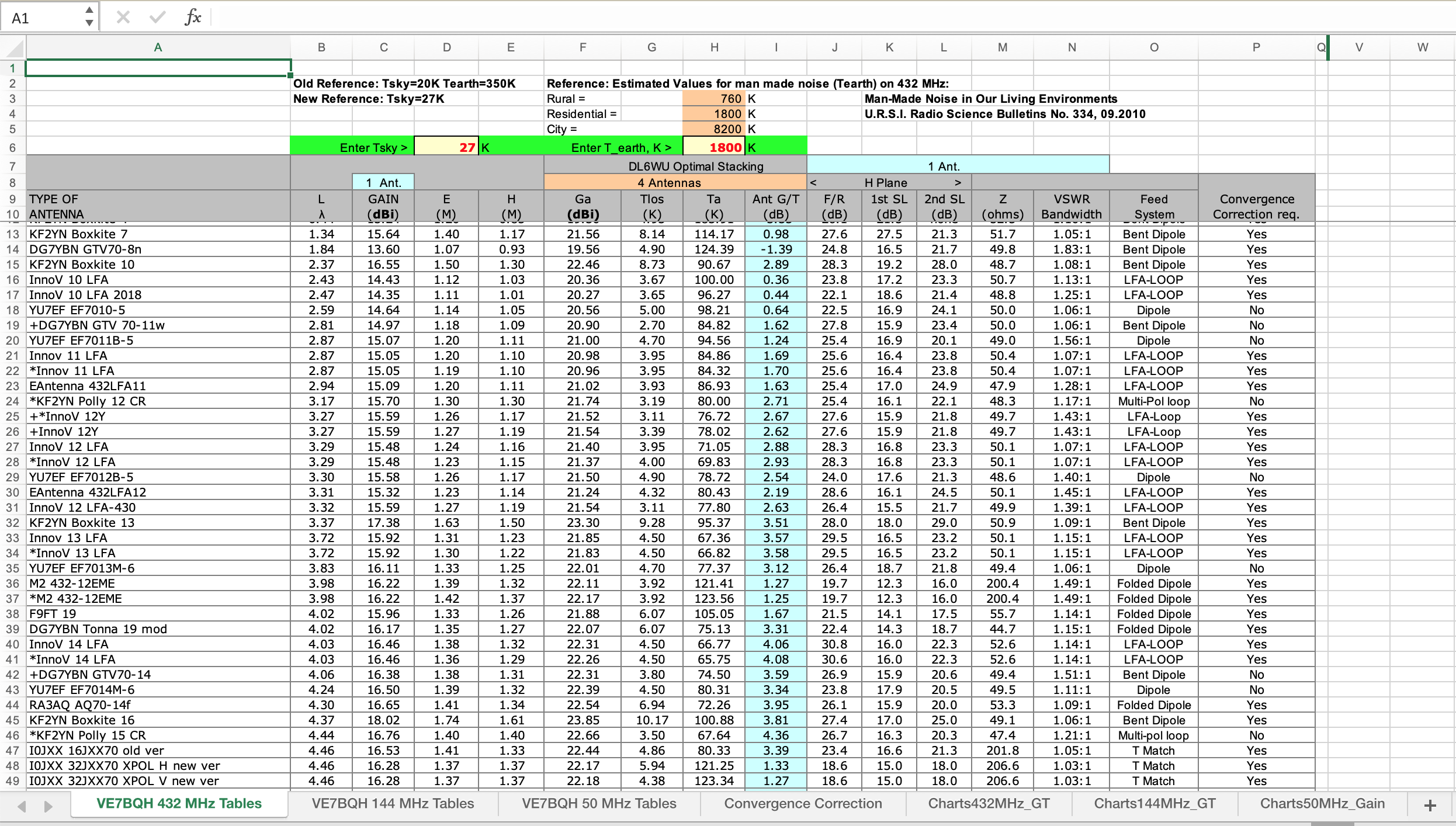 March 18, 2020 Editor: Paul Bourque, N1SFE | ||||
IN THIS ISSUE
The BARTG HF RTTY Contest coming up this weekend has an exchange that includes RST, Serial Number, and four-digit time value. Regardless of which logging program you're using, you'll want to make sure you have macro keys set up to send the entire exchange as well as the individual parts if you're asked for fills. Best practices also recommend that you use spaces as delimiters between the fields. For the non-digitally inclined, the Russian DX Contest is an everyone-works-everyone affair with more points awarded for contacts with Russian hams. You might need the list of Oblasts, and take a look at an analysis of the 2004 contest's errors to help understand the errors you may be prone to make. Many of the error scenarios discussed are not particular to the Russian contest. The weekend of March 28, count on the CQ WW WPX SSB Contest for lots of activity. There are some new overlay categories - see the mention later in this issue, and review the rules. For an opportunity for CW activity look for the FOC QSO Party -- it's self-described as "...not a contest but, rather, an activity day." "ARRL Suspending Tours and Guest Visits to Headquarters, W1AW" Complete information for all contests follows the Conversation section 19 Mar - 1 Apr 2020 March 19 March 20 March 21
March 22 March 25 March 26 March 27 March 28 March 30 March 31 April 1 The impact of the coronavirus pandemic is being felt everywhere. While our hobby can provide a distraction from real-world events, it's still not "contesting as usual." The D4C team canceled their multiop for the CQ WW WPX SSB Contest, and via Twitter was discouraging travel for any reason. Now with government-imposed restrictions on mobility in large parts of the world, it's no longer discretionary. Intra-country travel in many countries is possible as this is written, but that is changing. It's more prudent to stick to the single-operator category for the next few weeks or longer. Many near and medium term in-person amateur radio and contesting events are being canceled or postponed, including the 2020 Dayton Hamvention, Contest University, Contest Dinner Top Band Dinner, various DXpeditions, DX conventions, ARRL HQ guest visits, and so on. The ARRL website also has a page showing the list of hamfest cancellations. The N1MM Logger+ team is going to use crowdsourcing to provide a more accurate list of active cluster servers. According to an message to the N1MM Logger+ Groups.IO group by Larry, K8UT, N1MM Logger+'s new Cluster Rating System will report whether a spotting cluster website is available at connect time, and report this to a central location on the N1MM Logger+ website. This information will be "aggregated by continent and presented in a summary list of live cluster sites meeting certain criteria." It should provide help guide other N1MM Logger+ users looking for a functional cluster. More information on the feature is available on the N1MM Logger+ group. ARRL Frequency Measuring Test Participants (and Prospective Participants): The wrong URL was in the QST announcement for the April 24 FMT. The correct URL is fmt.arrl.org. The old website's URL is still active and has a clickable link to the new site so participants will still be able to easily report and view results. "Team Exuberance" is slated to give the CQ WPX CW Contest a go at the end of May at K3LR. They're anticipated to enter the multi-2 category. The team will include David Samu, VE7DZO; Marty Sullaway, NN1C; Philipp Springer, DK6SP; Bruce Yang, KN8U/BH4EPL; Tomi Varro, HA8RT; Mathias Acevedo, CE2LR, and Bryant Rascoll, KG5HVO. To help defray the costs of attending, the team has a GoFundMe campaign. Pat Volkmann, W9JI, wrote an article that appears in the March issue of the Ozaukee Radio Club's ORC Newsletter on using a calendar app to schedule ham radio events. Event organizers usually state the time and date in Coordinated Universal Time (UTC) so that everyone will know when the activity starts, regardless of your time zone. This, of course, requires that you convert UTC to your local time and date. The article describes how to schedule events directly in UTC, no conversion required. The full article can be found at http://www.ozaukeeradioclub.org/ in the Newsletter section. Terry N4TZ, CQ WPX Contest Director, writes: There are two new overlay categories in the upcoming CQ WPX SSB and CW contests. These CLASSIC overlays will appeal to those operators who wish to remain in (or revert to) simpler times before the complexity of multi-radio setups. In addition to the popular TB-Wires and Rookie overlays for single operator stations, we have added a CLASSIC overlay for single operator stations. This CLASSIC overlay is perfect for the traditional "boy and his radio" style operation. The entrant will use only one radio and no QSO finding assistance. It is similar to the CLASSIC overlay introduced in the CQWW contests, but does not have a 24-hour time limitation because all single operators are already limited to 36 hours in the WPX contests. The second overlay is for MULTI-ONE stations. It is also labeled CLASSIC (so your existing logging software will have no difficulty adding the overlay). It is aimed at the traditional "bunch of guys sharing a radio" crowd, in that only one radio can be used during the contest (no second radio to listen while the first one is transmitting). All other Multi-One rules apply, including the use of spotting assistance. As a reminder, selecting an overlay category is optional. Results of the overlay categories are listed in addition to the results in the main categories, so you can get a second certificate for the same contest, if your log is submitted within the 5 days after the contest deadline. (Terry N4TZ, via email) Mark, K6UFO, writes: "A new machine-learning computer model accurately predicts damaging radiation storms caused by the Van Allen belts two days prior to the storm, the most advanced notice to date, according to a new paper in the journal Space Weather." Rubber Clocking The name of a cheating technique where the logged time of a contact is changed from the actual time so that the contact will conform to the contest rules. For example, changing the time of a contact completed and originally logged at 00:00:05 UTC to when the contest ended at 23:59:59 UTC. Like any form of cheating, rubber clocking can be grounds for disqualification.
September 2019's ARRL VHF Contest results have been posted to http://contests.arrl.org. Mere hours after the close of the event, the preliminary results of the Spring Stew Perry Topband Distance Challenge are available. The Stew Perry scoring is based on distance and power -- a number of US station's "best DX contacts" were with stations in Japan. Use Unshift On Space Better known as UOS or USOS, Unshift On Space is a setting in your RTTY decoder that will change from FIGS mode to LTRS mode when a space character is encountered in the decode stream. This helps in noisy conditions to more reliably decode exchanges that are sent with spaces separating the fields. Most amateur radio RTTY decoders are by default set to use enable unshift on space. Elektor Labs has been following/updating a two-channel RF Power Meter project since 2015. The list of the project's capabilities and features has grown, and as of February 2020 includes support for a number of different power measurement ICs, up to 10 GHz range, LCD Touch Screen with GUI display, Wi-Fi, Bluetooth, logging to an SD card, and much more. There was a query on the RFI email list for the best way shielded HDMI cables for use between a computer and a monitor. Jim, K9YC, responded with some specific suggestions, and also discussed guidelines for categories of applications. "These guidelines work for any kind of cable -- coax feeding TX or RX antennas, power cables, wired ethernet, cables between equipment. They also work for other noise sources."
Mike, K7MDL, built an SWR/watt meter with coverage up to 6 GHz. He "was looking for a Arduino project but really wanted to find a board that came with a display and case. Not many out there in a single package. Ran across the M5Stack product line which comes with a battery base and a Wi-Fi Bluetooth enabled core unit with graphics LCD display built in. Has a ton of sensors and stackable function modules available. It is about $40 on Amazon Prime, cheaper if ordered from China. Most of the optional modules must be ordered from China today. It can be programmed with microPython, Arduino IDE or C++. I chose the Arduino IDE. Instructions are on the web how to set this up. I had the bulk of this working in a few hours sitting in a hospital lobby killing time recently. It is that easy." Check out the link to message for more information. Okay, this one is NOT specifically contest-related, but could be a lot of fun if you like to tinker with small Arduino-compatible MCUs and interesting integrated radio chips: Hackaday's "Multi-Band Receiver On A Chip Controlled by an Arduino." Using a Silicon Labs Si473x chip (BTW: Same folks that make those great Si5351 oscillators that are in many radios), it can provide coverage of the AM, FM, and shortwave (2.3 - 21.85 MHz) bands, and even covers 153-279 kHz. The glaring omission in the spec sheet for the chip is any mention of SSB. However, a little web searching hints at SSB and CW capability of the chip with some new firmware with help from Ricardo, PU2CLR. Hackaday's site includes an inspiring video of SSB and CW reception using this chip. Encoding Ethics Contests have rules. There are often multiple layers of rules; an example of one layer is "Entrants agree to be bound by the regulations of their national licensing authority" which makes clear operation must be legal from a government standpoint. This should be common sense. Then there are the specifications of contest specifics like the modes, times, and exchange, which are relatively easy to specify. But what about the more squishy operating methods of finding a frequency, controlling transmit bandwidths, identifying at particular intervals, and so on? Beyond just "the rules", contest sponsors can encode good manners and proper operating practices into the rules to tame the on-the-air behavior of the few entrants that believe "if it's not specifically banned, it must be allowed." Here are a few examples: The ARRL contest rules are a layer sandwich. At the bottom, there are the "General Rules for all ARRL Contests" which underpin but can be overridden by the "General Rules for HF Contests Below 30 MHz" or "General Rules for ARRL Contests Above 50 MHz." But the General Rules for All ARRL contests also state that an individual contest's rules "take precedence over the General Rules." There's no mention in any of the General Rules about on-the-air conduct or ethics, preferring to be prescriptive of operating details. A RTTY operator in an ARRL contest might not be popular if they started CQing on 14074 kHz after hearing no other RTTY signals there, and it would be a bad practice to do so, but they're not going to be disqualified. But you must send your call sign as part of the exchange for ARRL Sweepstakes. Consistent IDing is encoded in the Rule 4.2 about the contest exchange. The Worked All Europe DX Contest (WAEDC) rules are explicit about the frequency usage practices they think are important. "According to IARU recommendations operation should be avoided outside contest-preferred segments. No operation to take place on: CW : 3560-3800; 7040-7200; 14060-14350 kHz SSB: 3650-3700; 7050-7060; 7100-7130; 14100-14125; 14300-14350 kHz." The CQWW Rules include the spirit in which the rules are written: "Entrants are expected to follow the rules and best amateur radio practices. Violation of the rules of the contest or unsportsmanlike conduct may lead to disciplinary action by the Committee." Seems like that should do it, but it's there's wiggle room for lack of an authoritative "best amateur radio practices" guide for contest operation. But the Contest Committee does have ultimate say of what is and isn't allowed. That's all for this time. Remember to send contesting related stories, book reviews, tips, techniques, press releases, errata, schematics, club information, pictures, stories, blog links, and predictions to [email protected] 73, Brian N9ADG 19 Mar - 1 Apr 2020 An expanded, downloadable version of QST's Contest Corral is available as a PDF. Check the sponsors' website for information on operating time restrictions and other instructions. HF CONTESTS CLARA Chatter Party, Mar 17, 1700z to Mar 18, 1700z and, Mar 21, 1700z to Mar 22, 1700z; CW, Phone; Bands: 80, 40, 20, 15, 10m; RS(T) + Name + (state/province/country); Logs due: April 15. VHF+ CONTESTS AGCW VHF/UHF Contest, Mar 21, 1400z to Mar 21, 1700z (144) and, Mar 21, 1700z to Mar 21, 1800z (432); CW; Bands: 144 MHz, 432 MHz; RST + "/" + Serial No. + "/" Power class + "/" + 6-character grid locator; Logs due: April 6. Also, see Virginia QSO Party, FOC QSO Party, above. 19 Mar - 1 Apr 2020 March 19, 2020 March 20, 2020 March 21, 2020 March 22, 2020
March 23, 2020 March 25, 2020 March 26, 2020 March 27, 2020 March 28, 2020 March 29, 2020 March 30, 2020 March 31, 2020 ARRL Information Click here to advertise in this newsletter, space subject to availability. Your One-Stop Resource for Amateur Radio News and Information ARRL membership includes a choice of one print magazine: QST, the monthly membership journal, or On the Air, ARRL's new bimonthly publication for beginner and intermediate hams. All ARRL members can access both magazines digitally. Subscribe to NCJ - the National Contest Journal. Published bimonthly, features articles by top contesters, letters, hints, statistics, scores, NA Sprint and QSO Parties. Subscribe to QEX - A Forum for Communications Experimenters. Published bimonthly, features technical articles, construction projects, columns and other items of interest to radio amateurs and communications professionals. Free of charge to ARRL members: Subscribe to The ARRL Letter (weekly digest of news and information), the ARES E-Letter (monthly public service and emergency communications news), Division and Section news -- and much more! ARRL offers a wide array of products to enhance your enjoyment of Amateur Radio. Visit the site often for new publications, specials and sales. Donate to the fund of your choice -- support programs not funded by member dues! Reprint permission can be obtained by sending email to [email protected] with a description of the material and the reprint publication. ACKNOWLEDGMENTS ARRL Contest Update wishes to acknowledge information from WA7BNM's Contest Calendar and SM3CER's Contest Calendar. | ||||









